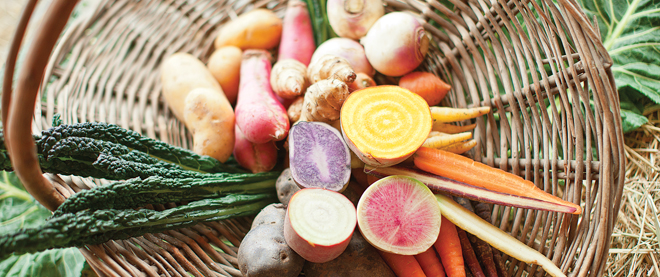What’s the Brix level of your carrot?
Forget ‘certified organic’—the real test of food lies in a 19th-century measurement
Simon Hayter
Share

The brief email that noted organic farmer David Cohlmeyer sent on Halloween to announce the completion of the long-anticipated sale of his farm, Cookstown Greens, contained a few lines explaining that he was departing on a note of triumph. At least, in the pastoral scheme of things. “The root cellar is filled with the best quality storage vegetables the farm has ever produced,” Cohlmeyer wrote. “The flavour profiles, density (weight per sac) and Brix have never been so high . . . ”
Brix? What’s that all about, then? And if you were saying goodbye to a loyal customer base that you had slowly built up over 23 years with a letter spanning a scant 200 words, would you focus on something called Brix, which neither other farmers nor my spell-check appear to have ever heard of?
Perhaps not. But it takes a special type to be a crusading organic farmer, and a success at it, too. And Cohlmeyer’s clientele were a rarefied lot, almost entirely composed of informed chefs willing to pay top dollar for a lumpy carrot just because it tasted superb—and could not care less that Cohlmeyer was too busy honing his methods of organic farming to bother filling out forms and paying for real, government-sanctioned organic certification. “I always thought that farmers who insisted on getting certification just weren’t good farmers,” Cohlmeyer explained over the phone from his house in Cookstown, Ont.
As it happens, this disparaging view was encouraged by giants in the field—like the late Robert Rodale, whose father J.I. Rodale was the founder of organic farming in the United States in the 1930s, and believed that most people have the notion backwards. “Robert Rodale told me that organic farming was never supposed to be about not doing something, but about what you did do, which was to introduce lots of organic matter into the soil. If you feed the soil with organic matter, you get more plants and fewer weeds, and then you don’t need herbicides and pesticides,” Cohlmeyer says.
This statement sounds a little implausible, I know. But having visited the fields at Cookstown, I can attest to this statement’s veracity. What interests me more is the nature of the plants that grow in said organic soil—and specifically, their level of Brix.
Degrees Brix is a scaled measure of sugar content (as devised by 19th-century scientist Adolf Brix) and, by association, flavour. The relationship between Brix and sugar made it a mainstay of winemaking and brewing, but for more general farming—even organic farming—it is largely ignored. Two of the other top vegetable growers in Canada, Jordan Sturdy, co-owner of the certified organic North Arm Farm in Pemberton, B.C., and Pierre-André Daignault, co-owner of Les Jardiniers du Chef in Blainville, Que., are not preoccupied with Brix and do not measure it, though a taste of their produce indicates that the levels are high.
Cohlmeyer, by contrast, has long proselytized on the subject, persuading several customers to procure their own Brix-measuring refractometers to take measurements from both the vegetables they like and those they do not. “I was sort of expecting it, but David’s vegetables always registered high, and supermarket vegetables barely registered,” recalled chef Martin Kouprie, co-owner of Toronto’s Pangaea Restaurant.
The pleasing sweetness of high-Brix vegetables is only part of the story. The other is storage life. As Cohlmeyer tells it, just as surely as Brix levels rose in his vegetables every year as a product of improving soil quality, so did his vegetables’ longevity—to the tune of an extra week each year. On which front, be advised that there are Cookstown-sourced radishes in my fridge that have been there for well over a month and yet remain as hard as rocks, as well as Jerusalem artichokes harvested back in November 2010, that are still crisp enough to slice on a mandoline. This does not happen with produce sourced from your local supermarket—or certified-organic farmers’ market—so I suspect Cohlmeyer was onto something.